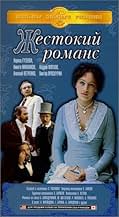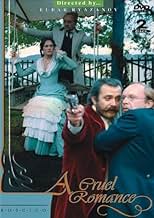Zhestokiy romans
- 1984
- 2h 22min
CALIFICACIÓN DE IMDb
7.9/10
4.2 k
TU CALIFICACIÓN
Agrega una trama en tu idiomaA bitter story about tender love and its cruel betrayal set in Russia of the 19th century.A bitter story about tender love and its cruel betrayal set in Russia of the 19th century.A bitter story about tender love and its cruel betrayal set in Russia of the 19th century.
- Dirección
- Guionistas
- Elenco
Boryslav Brondukov
- Ivan
- (as Borislav Brondukov)
Dmitriy Buzylyov-Kretso
- Ilya
- (as Dmitriy Buzylyov)
Ibragim Bargi
- Kuzmich
- (as I. Bargi)
Vladimir Myshkin
- Ofitser
- (as V. Myshkin)
- …
Vladislav Gostishchev
- Kuzmich
- (as V. Gostishchev)
- Dirección
- Guionistas
- Todo el elenco y el equipo
- Producción, taquilla y más en IMDbPro
Opiniones destacadas
This is my favorite movie, the best drama with plot twists and an unpredictable ending.
It must be said that the film is like a multi-layered pie and it reveals new sides with repeated viewings. To understand it fully, you need to know all the nuances of life in Russia in the 19th century.
The film is based on Ostrovsky's play "The Dowry" written in 1870. There is no need to look for any gender issues or struggle for any rights in it. This is the story of the Ogudalov family, who were left without a source of income after the death of their father. The mother of the family is looking for wealthy husbands for her daughters.
It must be said that the film is like a multi-layered pie and it reveals new sides with repeated viewings. To understand it fully, you need to know all the nuances of life in Russia in the 19th century.
The film is based on Ostrovsky's play "The Dowry" written in 1870. There is no need to look for any gender issues or struggle for any rights in it. This is the story of the Ogudalov family, who were left without a source of income after the death of their father. The mother of the family is looking for wealthy husbands for her daughters.
I read a comment from one of the readers that he has a difficulty understanding the film from the Western point of view. At least this time the viewer admits having problems with crossing the cultural boundary. Film is not riddled with cliches, it`s theatrical and highly artistic. It should be viewed almost as a poem translated into reality. It doest`n ask from actors just stand there and act natural, it asks for a brilliant, almost satirical work, which is performed in this movie perfectly. Realism is not the goal here. And yet, story like that very well could happened at that time, to the smallest details.
It is the best Russian film I have even seen. It is based on A.H. novel. The actor and actress are the best one. It also include some nice songs which really express the theme of the film. The film won the 1985' Russian National Film Festival.
This movie by Eldar Ryazanov surpassed my expectations. It really is quite an experience to see how Larissa's life unfolds; how she is coveted by men old and young, rich and poor... And yet every turn of events leaves a much bitter taste on her. It seems like if tears were a permanent mark of every Russian woman, like if, by definition, no woman would dare to call herself Russian without ever tasting the bitterness of life.
Ryazanov is quickly becoming one of my favourite directors. Though here I may be coming late, since he actually achieved fame and glory during Soviet time, a long gone era. Anyway, his "Zhestokij Romans" or "A cruel Romance" tells a tale which seems to me timeless.
Consider the plot of a very beautiful young woman, whose life ahead is full of promise.. But consider also that this girl's life is actually torn apart by events which seem (apparently) out of her immediate control, like if fate was conspiring against her at every other corner. Even her mother, willingly or not, at some point "sells" her -though like every other mother she blindly believes doing what's best for her daughter's future. Zhestokij Romans is sinonimous to drama: just watch the final scene, which is so powerful, telling and poetic...
I especially enjoyed the Gipsy scenes. All that dancing, joy and vodka were very moving in this film. Just as Yugoslav director Emir Kosturica has immortalised the Gipsy people (i.e. "Underground") we also see in "Zhestokij" droves of joyful Gipsies carrying everywhere they go that sound which is at the same time melancholic and joyous. Some other scenes reminded me of "Svadba" (Pavel Lounguine) a film which also features lots of partying and rivers of vodka despite the imminent disgrace and bitterness of life. I even found some parallels with "Luna Papa" another film from the former Soviet republics in which a young and pretty girl has to rapidly mature and leap from childhood into adulthood.
The Gipsy scenes also served as a very effective contrast between joy and doom. While they kept dancing, tragedy was occurring elsewhere. It's like they say: one man's happiness is another man's suffering.
That's why I consider this movie to be "Timeless". That's why I consider the last scene a gem of cinema, like anything I've seen before. Our lovely Larissa is embarked in that permanent quest for real love and affection.
Ryazanov is quickly becoming one of my favourite directors. Though here I may be coming late, since he actually achieved fame and glory during Soviet time, a long gone era. Anyway, his "Zhestokij Romans" or "A cruel Romance" tells a tale which seems to me timeless.
Consider the plot of a very beautiful young woman, whose life ahead is full of promise.. But consider also that this girl's life is actually torn apart by events which seem (apparently) out of her immediate control, like if fate was conspiring against her at every other corner. Even her mother, willingly or not, at some point "sells" her -though like every other mother she blindly believes doing what's best for her daughter's future. Zhestokij Romans is sinonimous to drama: just watch the final scene, which is so powerful, telling and poetic...
I especially enjoyed the Gipsy scenes. All that dancing, joy and vodka were very moving in this film. Just as Yugoslav director Emir Kosturica has immortalised the Gipsy people (i.e. "Underground") we also see in "Zhestokij" droves of joyful Gipsies carrying everywhere they go that sound which is at the same time melancholic and joyous. Some other scenes reminded me of "Svadba" (Pavel Lounguine) a film which also features lots of partying and rivers of vodka despite the imminent disgrace and bitterness of life. I even found some parallels with "Luna Papa" another film from the former Soviet republics in which a young and pretty girl has to rapidly mature and leap from childhood into adulthood.
The Gipsy scenes also served as a very effective contrast between joy and doom. While they kept dancing, tragedy was occurring elsewhere. It's like they say: one man's happiness is another man's suffering.
That's why I consider this movie to be "Timeless". That's why I consider the last scene a gem of cinema, like anything I've seen before. Our lovely Larissa is embarked in that permanent quest for real love and affection.
Ok, this was my first Soviet-era Russian movie, so it was difficult to assess by my (western) standards. By those standards the characters seemed simplistic and exaggerated, and the screenplay cliché-ridden. Also, by those standards, the cinematography came across as ill-developed for the day.
However, 'Cruel Romance' was something of a revelation for me. Just as the American Dream is expressed repeatedly (ad nauseam?) in Hollywood movies, I had a strong feeling after watching this movie that the 'Russian Dream' had been laid bare for my comprehension at last. The worship of impossible romance combined with blindness to all practical considerations and the expression of that romance in the gift of expensive baubles and other grand gestures are the main threads running through this story. And, despite the fact that 'Cruel Romance' is a Soviet-era depiction of 19th century Tsarist Russia, these are cultural traits to be found in abundance in modern-day Russians. For this reason watching the movie was a treat to me personally, and henceforth I will view my Russian friends and colleagues with a slightly higher degree of understanding.
Also, I hope to see many more Russian movies in the future !
However, 'Cruel Romance' was something of a revelation for me. Just as the American Dream is expressed repeatedly (ad nauseam?) in Hollywood movies, I had a strong feeling after watching this movie that the 'Russian Dream' had been laid bare for my comprehension at last. The worship of impossible romance combined with blindness to all practical considerations and the expression of that romance in the gift of expensive baubles and other grand gestures are the main threads running through this story. And, despite the fact that 'Cruel Romance' is a Soviet-era depiction of 19th century Tsarist Russia, these are cultural traits to be found in abundance in modern-day Russians. For this reason watching the movie was a treat to me personally, and henceforth I will view my Russian friends and colleagues with a slightly higher degree of understanding.
Also, I hope to see many more Russian movies in the future !
¿Sabías que…?
- TriviaLarisa Guzeeva's debut.
- ConexionesFeatured in Muzyka zhizni (2009)
Selecciones populares
Inicia sesión para calificar y agrega a la lista de videos para obtener recomendaciones personalizadas
- How long is A Cruel Romance?Con tecnología de Alexa
Detalles
Contribuir a esta página
Sugiere una edición o agrega el contenido que falta



































